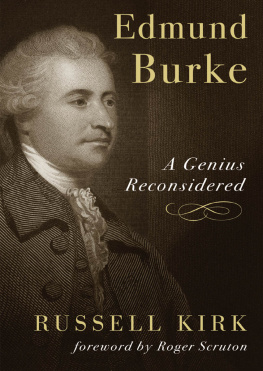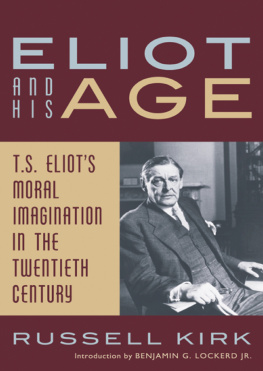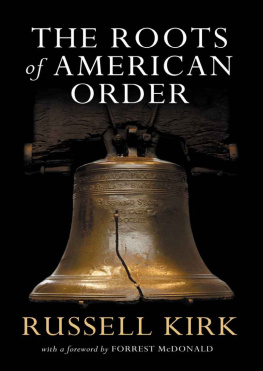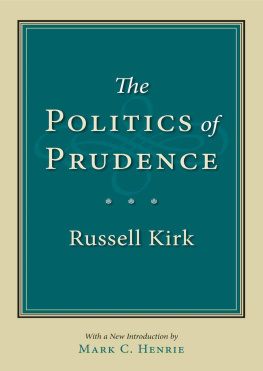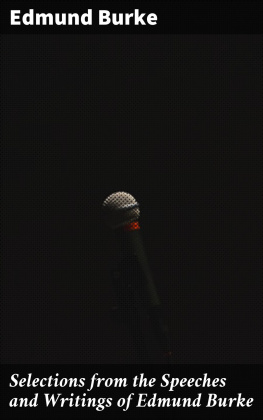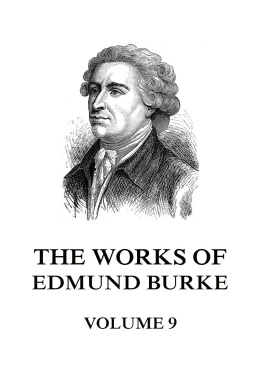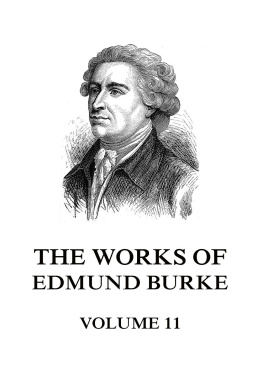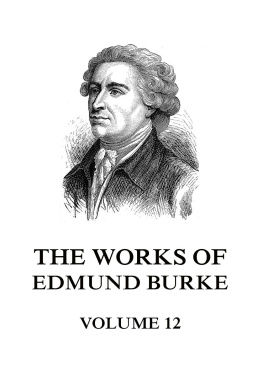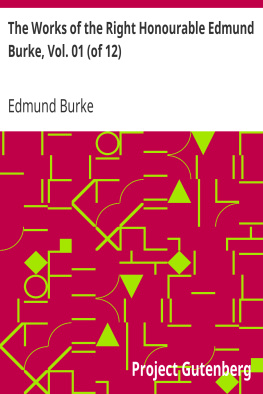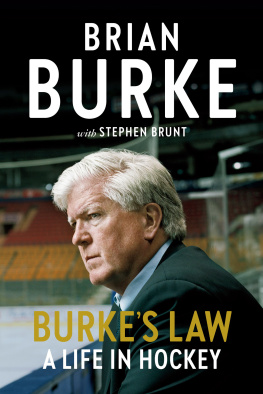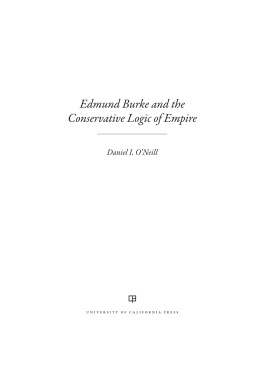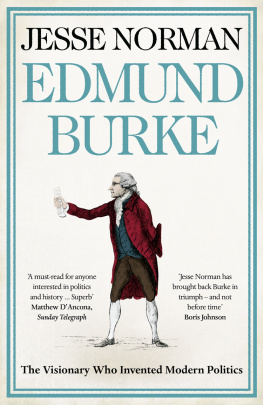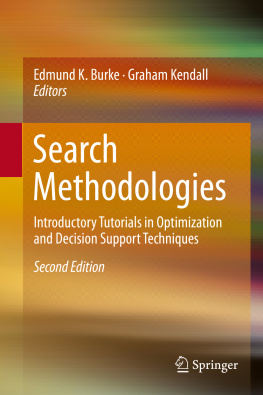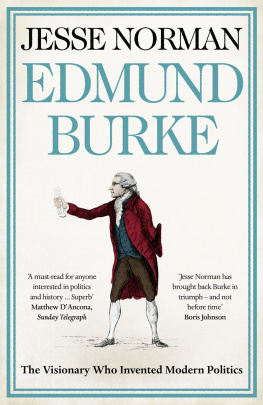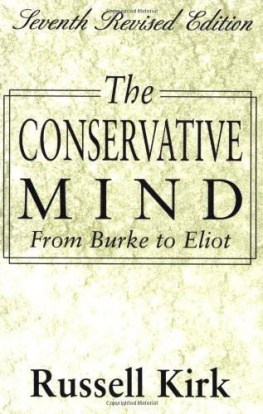By the same author:
The Politics of Prudence
Redeeming the Time
The Conservative Mind
The Roots of American Order
Eliot and His Age
Enemies of the Permanent Things
John Randolph of Roanoke
Rights and Duties
The Portable Conservative Reader
Beyond the Dreams of Avarice
Prospects for Conservatives
Americas British Culture
The Sword of Imagination
Edmund Burke
A Genius Reconsidered
Russell Kirk
with a foreword by
Roger Scruton

Wilmington, Delaware
Contents
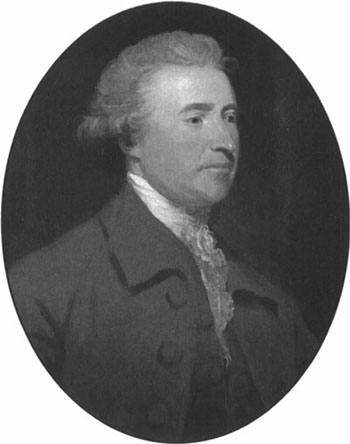
Portrait of Edmund Burke
James Northcote (1746-1831)
Royal Albert Memorial Museum, Exeter, UK
Courtesy of Bridgeman Art Library International Ltd., London/New York
Foreword
P olitician, propagandist, philosopher, man of lettersBurke was one of the outstanding figures of the eighteenth century, and the first statesman to recognize that there is no coherent response to the Enlightenment apart from social and political conservatism. It is unlikely that such a man should ascend to political office today. The democratic process prefers the glib, the half-educated and the plausible over the literate and the wise. How different things were when Burke entered the House of Commons readers of Dr. Kirks biography will discover. The American colonist, the Indian peasant, the French aristocratall found an advocate in Parliament who was as cool, eloquent, and profound a philosopher as could be found in any Parisian attic or Oxford common room. Burke could command the floor of the Commons; he could also dominate the opinion of the educated classes. His writings changed the course of politics, and laid the foundation for a political philosophy which has lasted to our day, finding its most powerful modern American representative in Russell Kirk.
It is especially welcome that Kirks biography should be reissued in this bicentennial year of Burkes death. Intelligence, cunning, know-how, stratagems, policiesall these we have in abundance. But wisdomthat sedate and circumspect awareness of the complexity of human things which we find in both Burke and his biographeris rare among us. We do not listen to ancestral voices, or strive to hear, beneath the din of politics, the rumors sent down to us from former times, which tell us of our imperfection. And until we listen, our future is in jeopardy.
The life that Kirk describes in these pages was a life of action; but it was an action which both sprang from thought and engendered thought. Perhaps no politician has ever speculated so deeply about the nature and limits of the human psyche as Burke. And his speculations are at every point put to practical use, in order to warn against the crazy desire to overthrow the laws and institutions on which our civilization has been erected. Dr. Kirk took up the mantle of Burke, and wrote passionately and wisely of permanent things, showing his fellow Americans that they could drift away from the vision of the Founding Fathers only at their peril. He was the conscience of modern America just as Burke was the conscience of Enlightenment Britain. Both understood that politics is possible only if some things remain unquestioned, and only if the desire to improve the world rests from time to time in a consciousness that the future cannot be known.
Kirk was not a politician, but he earned the respect of politicians, and strove to elevate the language and the thought of American conservatism to the level of his great predecessor. He learned from Burke that style is not a decorative adjunct to thought, but belongs to its essence. Because he found the words and the images with which to convey his vision to the youth of America, real conservative politicians continue to emerge in the United States, and to direct the future of their country along the path laid down for it by the contemporaries of Burke.
Kirks biography tells the story of a remarkable statesman, of a remarkable society, and of a remarkable period of human history. English readers will be gratified by the authors sympathy for our eccentricities, while American readers will learn much about the British Empire and its meaning. The book provides a clear and succinct guide to one of the great conservative thinkers of modern times. Kirk sees his subject as he was, and in terms of hopes and fears which he shares. Burke was engaged, he argues, in a continuous pursuit of justice, and valued order, tradition, and the conservative instinct largely because they prevent the massive injustices which ensue when men take it on themselves to manage their own destiny.
The lessons for us are many, and delicately suggested. Like Burke, Russell Kirk is no tub-thumping moralist, but a quiet, ironical and compassionate observer, who writes with a delightful ease and spontaneity. There is no finer monument to Burke than this book by his most original American disciple.
Roger Scruton
Prefatory Note
D uring the past forty years, immensely more has been learnt about Edmund Burke than the nineteenth-century biographers and critics knew. This short critical study, taking advantage of the opening to the public of a mass of Burkes papers, the publication of his correspondence in a scholarly edition, and the appearance of several important specialized accounts of Burke, is an attempt to assess Burke afresh.
Readers wishing to know more about the great statesman and man of letters will do well to turn to Carl B. Cones thorough and impartial political biography, Burke and the Nature of Politics (two volumes, 1957 and 1964); it is five times as long as the present essay in biography. The early life (1824) by James Prior remains worth reading; but most of the other biographies have been superseded by the discovery of new information, are superficial, or are long out of print and rarely encountered.
I heartily commend the scholarly studies about one or another aspect of Burkes mind or career by Ross J. S. Hoffman, Thomas W. Copeland, Peter Stanlis, Francis Canavan, James T. Boulton, Donald Cross Bryant, Gaetano Vincitorio, Thomas H. D. Mahoney, H. V. F. Somerset, Charles Parkin, Jeffrey Hart, Harvey C. Mansfield, Jr., R. R. Fennessey, Lucy S. Sutherland, John A. Woods, and other writers of recent years. Reference is made to these in the chapter-notes or in the bibliographical note at the end of this volume.
Some small portions of this brief life have been published in The Kenyon Review, The Sewanee Review, and Queens Quarterly.
Russell Kirk
Piety Hill
Mecosta, Michigan
Acknowledgments for Revised Edition
Andrew Shaugnessy, Claudia Pasquantonio, Glenn Pierce, Ellen Fielding, and Brooke Daley assisted in the preparation of this updated and revised volume. The foreword, epilogue, and chronology were added by the editor. Bruce Frohnen and Mark C. Henrie kindly suggested recent Burke scholarship to include in the bibliographical note. The dedication remains in the memory of John Abbot Clark.

